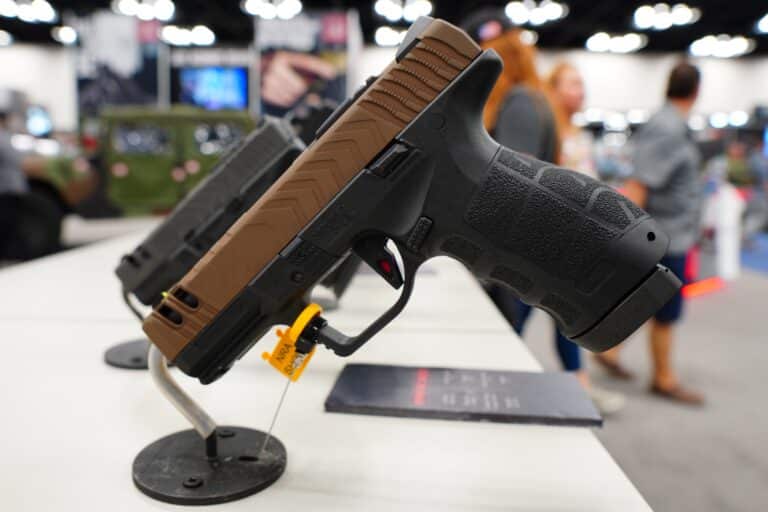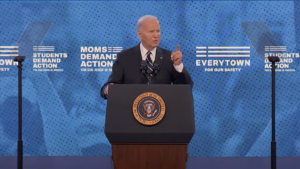President Joe Biden’s son can no longer own guns.
That’s one of the conditions of the deal he struck with federal prosecutors that was announced on Tuesday. In addition to pleading guilty to two misdemeanor tax charges, Hunter Biden agreed to a diversion program in lieu of felony charges related to his 2018 purchase of a firearm. He will avoid jail time under the deal but will have to stay clean for 24 months and agree to never own guns again, according to The New York Times.
“The second Information charges the defendant with a firearm offense—namely, one count of possession of a firearm by a person who is an unlawful user of or addicted to a controlled substance, in violation of 18 U.S.C. §§ 922(e)(3) and 924(2)(2) (2018). The defendant has agreed to enter a Pretrial Diversion Agreement with respect to the firearm Information,” a letter filed by the Department of Justice with the US District Court in Delaware reads.
The plea still needs to be approved by a federal judge before it is official. If the judge agrees, Hunter is expected to appear in federal court soon to enter his guilty plea. The deal brings the investigation into Hunter’s foreign business dealings and drug use to a close, according to a statement from his lawyer Chris Clark.
“I know Hunter believes it is important to take responsibility for these mistakes he made during a period of turmoil and addiction in his life,” Clark told NBC News. “He looks forward to continuing his recovery and moving forward.”
The deal avoids a drawn-out legal battle as Hunter’s father begins his re-election campaign. It is also likely to spark further debate over whether the punishment he received is justified or not.
Former president Donald Trump, who is facing multiple federal felony charges for allegedly withholding and mishandling classified documents at his Florida country club after his election loss in 2020, decried the deal.
“The corrupt Biden DOJ just cleared up hundreds of years of criminal liability by giving Hunter Biden a mere ‘traffic ticket,'” Trump, who appointed the US Attorney that handled Hunter’s case, posted on Truth Social. “Our system is BROKEN.”
Ian Sams, a spokesperson for President Biden, said, “The President and First Lady love their son and support him as he continues to rebuild his life,” and they wouldn’t comment beyond that.
The ordeal began in 2018 when Hunter bought a Colt Cobra revolver from a Delaware gun store. Hallie Biden, the widow of Hunter’s brother and his then-lover, found the gun shortly afterward and threw it away in a dumpster behind a nearby grocery store out of concern for Hunter’s safety. Local police later recovered the firearm after a man looking for recyclables found it in the dumpster.
The gun store owner who sold Hunter the gun later accused the Secret Service of attempting to take the background check form related to the sale in a potential effort to cover up the incident, according to Politico. The owner refused and turned the records over to the ATF instead.
The news of Hunter’s gun purchase sparked outrage among Republicans and gun-rights advocates, who argued his publicly-disclosed drug habit meant he had likely lied on the background check form in order to obtain the gun. Federal law bars anyone who is a user of or addicted to unlawful drugs from buying or even possessing firearms. Alan Gottlieb, founder of the Second Amendment Foundation, called for his prosecution.
“Hunter Biden lied on the Federal Form 4473 about his habitual drug use when he bought a handgun,” he told the Washington Free Beacon in April 2021. “That is a felony.”
Dru Stevenson, a South Texas College of Law professor who has studied how the drug-use prohibition in federal gun law is applied in practice, said the law Hunter is accused of violating is generally interpreted very narrowly. He said most courts and the ATF have concluded there needs to be evidence of the suspect’s ongoing drug use when they bought their gun, not necessarily just evidence of sporadic or one-time drug use. He said it is generally used only as a tack-on charge combined with other drug or gun charges.
“As a general matter, it is extraordinarily rare to see cases where 922(g)3 is brought as a standalone charge – the circumstances of the arrest that led to the charge typically involve a drug bust or drug-related violence, so it is one of several charges in the case,” Stevenson told The Reload.
He estimated there are only about 200 convictions a year for standalone charges like the ones Hunter Biden faces. Stevenson said there are likely two reasons why such convictions are so rare.
“Generally, federal law enforcement does not go searching for violators, but instead these cases arise in the context of an arrest or search for something else,” he said. “For example, in states that issue medical marijuana cards, it would be fairly easy for law enforcement to cross-check these names with, say, hunting licenses or concealed carry permits issued by the state, but I have never seen an instance where this occurred. I’ve seen/heard of cases where someone failed their background check when trying to purchase a gun due to their medical marijuana status, but I have never seen a prosecution of the attempted purchaser, though in theory it would be possible.”
Stevenson said the second reason is that these kinds of violations fall further down on the DOJ’s priority list.
“I assume the vast majority of cases where 922(g)3 would be the only charge, or perhaps the only felony charge in tandem with a nonviolent misdemeanor charge, would go to the pretrial diversion program rather than a normal prosecution, due to limited resources in local US Attorney offices,” he said.
Still, Gottlieb argued that rarity is “one of the problems” with the government’s approach to enforcing current laws. “The president needs to start with the prosecution of his lying son before he starts persecuting legal gun owners who would never leave a firearm in a trash dumpster to be found by a stranger like his son did,” Gottlieb told the Free Beacon.
Additionally, Hunter may have inadvertently put more pressure on prosecutors to do something about his gun purchase when he released a memoir detailing his chronic drug use during the time when he purchased the gun. He wrote he was “smoking crack every 15 minutes” in the book that was released just weeks after news of the Secret Service allegations were reported.
Hunter’s pretrial diversion deal also comes under the shadow of the Biden administration tightening gun restrictions nationwide. Biden’s pistol-brace ban has left millions of Americans with potential federal felony charges hanging over them after the ATF’s attempt to register the devices garnered little compliance. Additionally, the agency reiterated earlier this month it would continue to enforce the same prohibition Hunter is charged with violating against those in states where marijuana has been decriminalized.
At the same time, the constitutionality of the lifetime gun ban for drug users has come under new scrutiny thanks to a new standard for Second Amendment cases set by the Supreme Court in 2022’s New York State Rifle and Pistol Association v. Bruen. In April, a federal district judge in Texas dismissed a case against an El Paso woman charged with gun possession as an unlawful user of marijuana and with transferring a firearm and ammunition to her husband, who was an illegal user of multiple controlled substances.
“In short, the historical tradition of disarming ‘unlawful’ individuals appears to mainly involve disarming those convicted of serious crimes after they have been afforded criminal process,” Judge Cardone wrote in her opinion. “Section 922(g)(3), in contrast, disarms those who engage in criminal conduct that would give rise to misdemeanor charges, without affording them the procedural protections enshrined in our criminal justice system.”
“Moreover, § 922(d)(3) does not tie its restrictions on gun use to intoxication or public safety in the way that historical gun regulations did,” she added. “Nor does it provide the pre-deprivation process that laws disarming dangerous individuals historically required. In sum, § 922(d)(3) does not withstand Second Amendment scrutiny for much the same reasons that § 922(g)(3) does not.”
That decision came shortly after a federal judge in Oklahoma came to the same conclusion in a case against a man who was arrested for having a gun and marijuana in his car during a traffic stop.
Hunter Biden had plans to challenge the constitutionality of the gun prohibition for drug users as well, according to a May 31st report in The Times. The pretrial diversion agreement forestalls that potentially precedent-setting court fight so long as Hunter is able to abide by its conditions.






